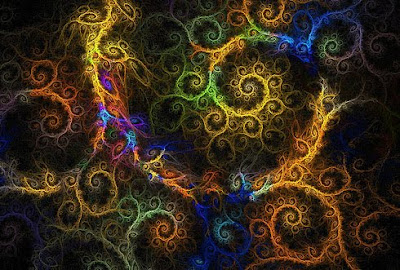Rational mysticism.

I'm sorry, but I have to laugh a happy laugh at that joke. "Rational Mysticism" implies that regular mysticism is irrational, or that there is a regular, a rational and an irrational. Mysticism is not irrational. It is simply not rational. And yet, the paradox is that being not rational it is entirely rational -- and this is the point the author misses, because the experience is the thing.
Without the experience of the paradox of the not-rational becoming rational yet remaining not-rational, there is no hope of understanding what cannot be expressed.
Rationality depends upon expression. If it cannot be expressed it is not rational. Yet, by its very nature the ineffableness of paradox depends upon its inexpressibility. Herein lies the rub.
The goal of Aristotlian scientism is to define all things. That which cannot be defined does not exist. Therefore paradox does not exist.
Yet paradox most certainly exists.
Paradox is the point where the Specific connects to the All and comes out the Opposite. Sorta like a black hole, if it helps to use an example of something we don't understand to understand something we cannot express . . . and it does, doesn't it?
Again, I have to laugh because this is how it all goes when trying to define the stuff that Aristotle and his followers call "metaphysics". Aristotle didn't know what to do with it, and neither does scientism -- and yet, isn't the ultimate nature of reality exactly what scientism is supposedly attempting to discover? Yet, the paradox here is that in seeking to define the undefinable scientism is, in actuality, making reality seem differently mysterious than the mysteriousness it inherently has.
Mysteriousness, after all, is simply in the mind of the interpreter. Nothing is inherently mysterious, yet everything is mysterious in its very existence.
And so it goes.
Experience is the thing. Let go of scientism. Do not interpret what you experience. Be the experience. Mysterious Understanding is only possible through unthought experience. What is unthought naturally cannot be spoken for there are no words for not-thought.
But it can be experienced.
Now . . . if you 'get it' but you can't explain it, then you are experiencing the not-rational rational paradox.
Go ahead. Speak it if you can. Aren't the thoughts almost formed in your mind? Thoughts that are becoming words but never stop becoming words and so are never words. It is just like pi. Pi never stops going endlessly in its numerical spiral. Yet it is not like pi at all because pi does not exist, and yet this experience certainly does exist.
Yes, pi does not exist. There is no such thing in the universe as a naturally perfect circle. All such circular things are simply truncated spirals. And yet, cannot scientism construct a perfect circle? Has not scientism decreed that by using pi one can create a perfect circle? And yet, how does one use pi, exactly, when it never stops becoming itself. Any formula that uses pi never stops becoming a formula, so never becomes formula, and is not a formula.
And yet, it is a formula.
But pi is the opposite of not-thought, and so is not like not-thought at all.
Yet it is.
Even though science has thought an unthinkable thing in its perfect circle, a thing that does not exist, scientism has not thought not-thought.
Scientism creates what is not, yet claims to only discover what is. Scientism does exactly what it says metaphysics does -- imagine things that don't exist.
Like a perfect circle.
(Go ahead, laugh! It's really a fractal!)
Y'see, it's
ALL like this. I love it!
This is fun, and yet I am being completely, philosophically serious!
OK, that is the end of my post, but it is also the beginning of a thought.

The thought continues to become a thought.
What Is, What Is Not . . . and What Is Becoming. The philosophies of Dualism fail us here, as does the tactic of killing the messenger. Horgan attacks the messengers in every case, and finds them human. That they are human means they have foibles. Scientifically, that means each person is an uncontrolled experiment, and that their reports of their personal experiences are unverifiable by any known means.
What else could be expected?
One must experience the experience in order to determine the veracity of the reports. Once the experience is known, the reason for discrepancies are known -- and therefore they are no longer discrepancies, at all . . . and yet, they are. It cannot be explained. It must be experienced. Reality is a deeply personal experience.
Reality is not a shared illusion, and yet, it is the true shared illusion.
Rational? Not rational? Depends on your experience. It is both, and neither. Laugh!
It is.
Horgan's problem is that he wants to be told the answer before he knows the answer. Before he finds out what the nature of reality is, he wants to make sure he can handle it -- that he isn't frightened to death, or worse, driven mad.
Sorry, no promises there except to say that the sanity it bestows is identical to insanity, but it is not insanity. It is welcome and it is fulfilling. It is wonderful and it is mysterious. It is everything and it is nothing.
Nothing.
No thing at all. Zero. Infinite zero.
There are some promises, however, such as they are: once known it can never be forgotten, nor can it be communicated. There's no going back because "back" never was, but always is, yet hasn't become. Have fun there (the Here that is Not-Here, but Is Here), and remember to laugh!
Paradox.
Beautiful!
By the way, Horgan touches fractals when he describes the theory of emanationism, and he wanders oblivious to the fractals in his relating of psychedelic experiences. One of the secrets of reality is fractal. The Mongols knew that secret.

Happy Valentine's Day!
















